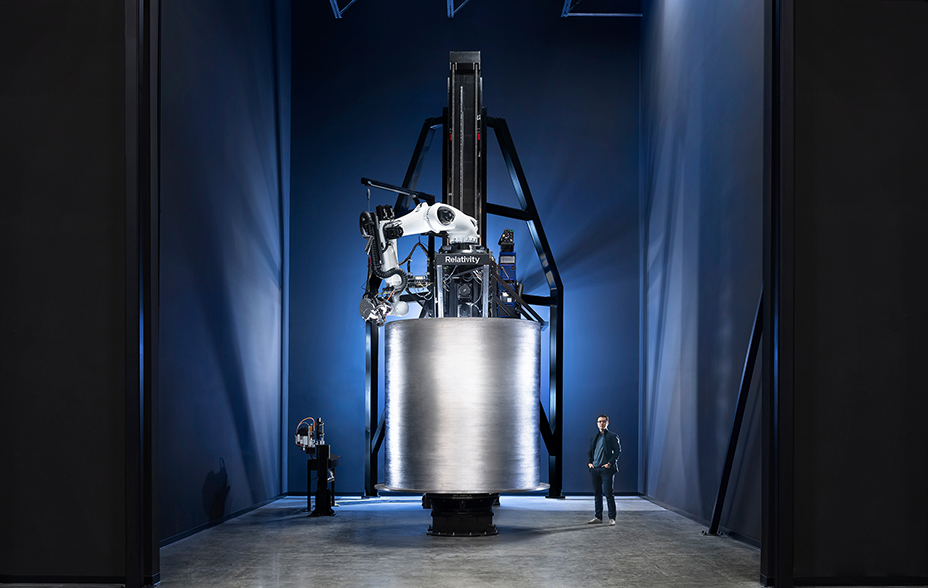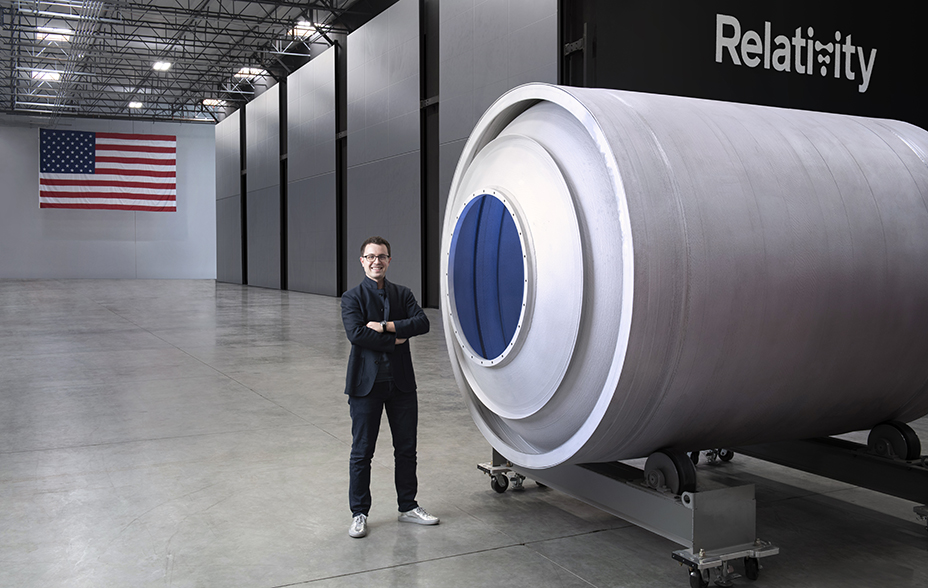July 2021
Article
Rocket man: the future of aerospace engineering
Claire Shaw – Portfolio Director
A trip to Mars may not be high on the average person’s to-do list, but Scottish Mortgage is prepared to embrace the radical thinkers and their companies striving to get us there.

© Relativity Space. Terran R, first fully reusable, entirely 3D-printed rocket.
The value of shares in Scottish Mortgage, and any income from them, can fall as well as rise and investors may not get back the amount invested.
Of all the aerospace companies founded in the last 20 years, only two have Mars firmly in the centre of their business plans: Elon Musk’s SpaceX and Relativity Space, co-founded in 2015 by Tim Ellis. Whereas Musk wants to send the first people to Mars, Ellis wants to send the first factory: a space-faring civilisation will require a portable manufacturing capability if it is to start building a home on another planet, and 3D printers are uniquely suited to the task.
Civilisation on Mars might seem far-fetched. For Scottish Mortgage, however, we believe we must embrace seemingly unreasonable propositions to discover the most extraordinary companies. Disrupting 60 years of aerospace manufacturing by revolutionising how rockets are built is exactly the sort of radical thinking that excites us, as we actively seek out and embrace the unconventional.
Blast Off
Launching a rocket into orbit is a daunting proposition. In the 10-minute flight from launchpad to space, a staggering array of systems must work together perfectly – turbines, valves, avionics and software, to name a few. If any module fails, the whole rocket can come crashing down.
Traditional launch vehicles are made up of over 100,000 parts, each individually manufactured, inspected and fitted together. Aerospace manufacturing has historically relied on large factories, fixed tooling and complex supply chains to build costly rockets over two years or longer.
The cost of a rocket is not determined by its raw materials – those are reasonably ‘cheap’. It is largely driven by inefficiencies in the supply chain, the complexity of sub-assemblies, and the human labour required to supervise and stitch it all together. Relativity Space is addressing all these challenges head-on with 3D printing. Its ‘Stargate’ factory will be the first aerospace platform to automate rocket manufacturing, by vertically integrating intelligent robotics, material science and data-driven 3D printing technology.

Everything that Flies will be Printed
Relativity Space is hoping to show where large scale, high throughput and autonomous additive manufacturing may lead. Should it succeed in proving its concept, the implications are huge and likely to be a real boon for society, as this technology is applied across countless other industries. Relativity’s co-founder Jordan Noone said in 2020 that, “In 20 years, everything that flies will be printed – it’s inevitable”. Similarly, Tim Ellis likened 3D printing to a paradigm shift in manufacturing, stating:
“I think really the thing people haven’t gotten about our approach or 3D printing in general is its actually more like transitioning from gas internal combustion engines to electric or on premise to cloud… 3D printing is a cool technology but more than that, it’s actually software and data-driven manufacturing and automation technology”
Relativity Space’s mission and first-mover advantage gives it one of the best chances of translating this technology into a lucrative industry with enduring economies of scale.
In building the world’s first autonomous rocket factory, the company sees itself as pioneering the ‘factories of the future’ which fuse together 3D printing, artificial intelligence and autonomous robotics. Its first rocket, Terran 1, will be the world’s first almost entirely – 95 per cent – 3D-printed rocket. Designed to launch individual satellites into orbit, the first rocket launch is scheduled for the end of 2021. Society’s growing appetite for data and connectivity, the difficulty and expense of providing these purely via terrestrial means versus the increasing practicality of space-based distributed systems, should underpin the long-term demand for satellite volumes and launch services. Just as the auto industry seems to be accepting electric vehicles as the future, the aerospace and telecommunications industries are increasingly attracted by the practicalities that space-based solutions offer.

From Lego to Go Get
Ellis is not your usual start-up rocket company founder. He doesn’t have the billions of Elon Musk or Jeff Bezos with his Blue Origin project, but he does share their capacity to think big and approach things differently. He is known to remind his engineers that they need to put as much thought into designing and producing the company’s culture as they do into designing and building the rocket.
Growing up in Plano, Texas, Ellis spent hours each day designing his own spaceships from large piles of black LEGO – black because they looked the coolest! His bent for creativity and design led him to the University of Southern California where he majored in aerospace and it was here he became friends with Jordon Noone, with whom he would later co-found Relativity. After graduating, Ellis and Noone started their careers at Blue Origin and SpaceX respectively. Both found themselves frustrated at the limited role 3D printing was playing compared to the longer term promise it held – and decided to strike out on their own. That was barely six years ago, yet the company has made enviable progress in the interim – attracting a broad team of industry veterans, an enviable backlog of orders, and significant growth capital to continue scaling its operations.
To Boldly Go
Relativity Space is trying to make a huge leap forward in aerospace, meaning we should expect, if not welcome, failures along the way. Its emphasis on manufacturing and design flexibility gives Relativity Space the ability to afford to fail as it learns from every failure. The fact that experimentation is encouraged is almost the antithesis of many traditional aerospace industries but is one of its great strengths.
Being a private company also gives Relativity Space the freedom to experiment without the pressures of impatient public market participants. For Scottish Mortgage, we believe that in order to give founders such as Tim Ellis the best chance of succeeding, they need patient, supportive investors like ourselves who are mindful of the long-term gains that can be accomplished from letting a company create, develop and learn at its own pace.
We at Scottish Mortgage are unrelenting in our mission to invest in progress and a large part of that mission is actively seeking out companies who are thinking differently. We believe it is these companies who will be the winners of tomorrow and help pave the way to a future that is, perhaps literally, out of this world.
About the author - Claire Shaw
Portfolio Director
Claire Shaw is a portfolio director and plays a prominent role in servicing Scottish Mortgage’s UK shareholder base. Before joining in 2019, she spent over a decade as a fund manager with a focus on managing European equity portfolios for a global client base. With a background in analysing companies and communicating investment ideas, Claire is also responsible for creating engaging content that makes the Scottish Mortgage portfolio accessible to all its shareholders. Beyond that, she works closely with the managers, meeting with portfolio companies and conducting in-depth portfolio discussions with shareholders.
Important information
This communication was produced and approved at the time stated and may not have been updated subsequently. It represents views held at the time of production and may not reflect current thinking.
This content does not constitute, and is not subject to the protections afforded to, independent research. Baillie Gifford and its staff may have dealt in the investments concerned. The views expressed are not statements of fact and should not be considered as advice or a recommendation to buy, sell or hold a particular investment.
Baillie Gifford & Co and Baillie Gifford & Co Limited are authorised and regulated by the Financial Conduct Authority (FCA). The investment trusts managed by Baillie Gifford & Co Limited are listed on the London Stock Exchange and are not authorised or regulated by the FCA.
A Key Information Document is available by visiting our Documents page.
Any images used in this content are for illustrative purposes only.









